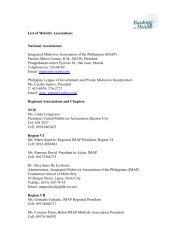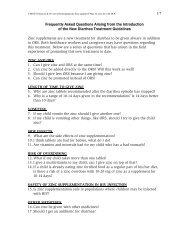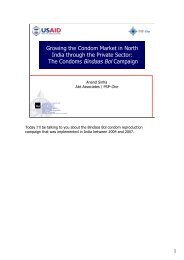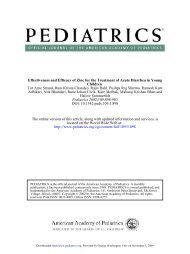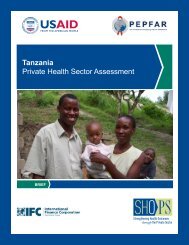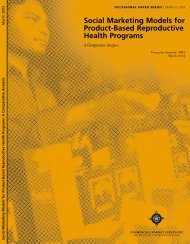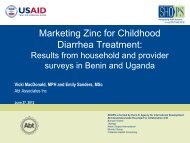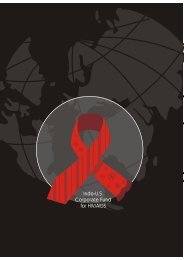Nigeria Private Sector Health Assessment - SHOPS project
Nigeria Private Sector Health Assessment - SHOPS project
Nigeria Private Sector Health Assessment - SHOPS project
You also want an ePaper? Increase the reach of your titles
YUMPU automatically turns print PDFs into web optimized ePapers that Google loves.
manufacturer to qualify it for an NAFDAC registration. Once registered, if a manufacturer produces a<br />
substandard lot, it is not likely that NAFDAC would be able to stop its distribution. WHO and DFID<br />
have helped NAFDAC build up this capacity, but there is still a way to go. DFID reports that a recent<br />
sampling showed that up to 40 percent of drugs were substandard, including drugs from NAFDACapproved<br />
manufacturers. Contraceptives have not tested badly, but distribution of contraceptives along<br />
with other prescribed drugs is likely to be affected if NAFDAC institutes new procedures around batch<br />
testing prior to distribution.<br />
Ensuring proper handling and storage of drugs is an easier problem than guaranteeing drug purity, but it<br />
is still one that requires significant resources. As currently funded PCN does not have such resources.<br />
Inspection of PMVs is funded only by the 1000n licensing fee, which is not enough to support staff and<br />
logistics capacity. Besides the zoning problem of PMVs, many sell drugs that are not on the approved<br />
list, and many store and repackage drugs in a manner inconsistent with policy. The assessment team<br />
observed a few PMV proprietors repacking products into smaller quantities to make them more<br />
affordable to consumers. This practice may seem harmless, but sometimes such actions can have serious<br />
consequences. To monitor PMVs closely enough to reduce or eliminate such practices would require far<br />
more resources than the PCN and its PMV committees are likely to be able to mobilize.<br />
The two quality functions, or course, are not completely separate. It can be argued that the more<br />
untrained commercial traders are involved in selling drugs through unregulated premises, the more likely<br />
that low-quality drugs will find their way into the distribution channels. When qualified pharmaceutical<br />
staff in accordance with the law perform procurement, handling, and shipment, it is less likely that lowquality<br />
products will get into the system. According to the DFID representative, the lowest incident<br />
of substandard drugs was found in the city of Jos, due to the high proportion of drugs in that area<br />
that were procured through CHANPHARM’s procurement agency, which procures mostly generic<br />
European drugs and manages drug importation and storage down to the retail level. The Partnership for<br />
Transforming <strong>Health</strong> Systems <strong>project</strong> has developed an interesting model in Benue state for a pharmacy<br />
depot that works on a revolving fund basis and resupplies both public- and private-sector providers. This<br />
model might be a way to ensure that low-quality products stay out of the commercial retail market.<br />
Enforcement of quality-assurance laws has to be done with balance. Strict enforcement of all of the rules<br />
without any compensatory measures to increase access could put more drug sellers out of business<br />
and further reduce access to care. Moreover some of the regulations appear to add little value to drug<br />
quality; for example, according to the laws, pharmacy premises have to be owned and cannot be rented.<br />
Currently there is too little regulatory enforcement, however, which is compromising drug quality<br />
without increasing access where it is most needed.<br />
5.7 Cross-Cutting Area: The National <strong>Health</strong><br />
Insurance Scheme<br />
Several years in the making, the National <strong>Health</strong> Insurance Scheme (NHIS) is in the process of a national<br />
rollout. While it is still early in the operational phase, prospects are encouraging and the potential is<br />
significant, especially for developing the private sector for health. Most providers the NHIS contracted (80<br />
percent) are private. A national health insurance scheme could increase financial access to health services<br />
for a large segment of the population, provide leverage for ensuring quality through provider accreditation,<br />
and encourage the creation of new health practices by ensuring providers have regular income streams.<br />
For these reasons the NHIS deserves special attention in any private health sector initiatives.<br />
22



